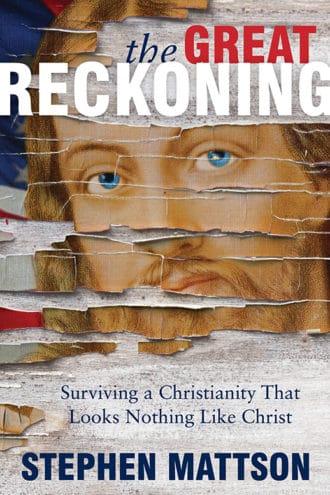
American Christianity has been a horrible place for women. It ignores them, abuses them, assaults them, objectifies them, oppresses them, and then attempts to theologically rationalize it all as being “Biblical” and “holy.” The Church has been a willing co-conspirator in the widespread affliction of women.
Regarding the most important issues related to family, education, careers, healthcare, finances, politics, safety, and even spirituality, Christianity has continuously prioritized men at the expense of women. To question this status quo is to be branded a “troublemaker,” “heretic,” and other terms too demeaning to even utter. This toxic religiosity, often branded as “Christianity,” has socialized its adherents to dehumanize women related to every aspect of our society.
Christianity has a history of manipulating the Bible to reinforce patriarchy, in which men are seen as spiritual leaders and women are to submit to their authority. This has resulted in the smothering of women’s gifts of pastoral leadership and ministry. Women are intentionally excluded from roles of authority, and their truth, wisdom, and experiences have been unfairly dismissed.
Christianity has a history of manipulating the Bible to reinforce patriarchy.
Christendom is still predominantly built on male-dominated authority structures. Only nine percent of Protestant American pastors are women. The overall ratio of women spiritual leaders is probably far less when you consider that the Roman Catholic Church has yet to officially ordain women. None of this takes into consideration the countless “pastors’ wives” who work (often in addition to their paid professions) in ministry roles yet receive little to no compensation.
Women make up about 50 percent of all medical school graduates, 60 percent of all accountants, and 67 percent of all psychologists. Yet a significant portion of Christian churches and denominations still forbid them from becoming pastors and ordained ministers, banning them from various positions of leadership.
Furthermore, Christendom has remained regrettably silent in the face of the epidemic of harassment, abuse, and violence against women. One in three women has been a victim of domestic violence. One in six women will, sometime during her life, be the victim of rape or attempted rape. More than half of all women have been sexually harassed at their workplace, and a staggering 87 percent of women between the ages of eighteen and twenty-five say they’ve experienced some form of harassment.
Christian leaders, on the whole, have failed to address the abuse and assault experienced by more than half of all Christian believers. When was the last time your congregation dedicated a sermon or service to sexual harassment, assault, or abuse? If you are fortunate enough to have experienced such a service, you’re the exception to the rule. Despite attending all sorts of churches within a variety of denominations and despite sitting through countless sermons, I have not once heard violence against women addressed in any significant capacity. I’ve heard homilies on the Leviathan, the Nephilim, and the dimensions of Noah’s ark; I have not heard a single sermon confronting a problem that affects nearly every woman in every congregation, and around the world.
When was the last time your congregation dedicated a sermon or service to sexual harassment, assault, or abuse?
Instead of taking a proactive approach against sexual assault, harassment, and abuse, Christianity has been complicit in its spread. Rachael Denhollander, the first women to accuse USA Gymnastics team doctor Larry Nassar of sexual abuse, had this to say about churches:
Church is one of the least safe places to acknowledge abuse because the way it is counseled is, more often than not, damaging to the victim. There is an abhorrent lack of knowledge for the damage and devastation that sexual assault brings. It is with deep regret that I say the church is one of the worst places to go for help. That’s a hard thing to say, because I am a very conservative evangelical, but that is the truth. There are very, very few who have ever found true help in the church.
Rather than address this widespread crisis, Christendom has created toxic and unregulated environments in which predatory men (and women) often face no consequences for their actions. Rather than publicly denouncing the perpetrators, large contingents of Christians actually support them, especially if they share similar political and spiritual beliefs. Denhollander says she found little support when she spoke out against her abuser: “Advocacy for sexual assault victims, something I cherished, cost me my church and our closest friends three weeks before I filed my police report,” she said. “I was left alone and isolated. And far worse, it was impacted because when I came out, my sexual assault was wielded like a weapon against me.”
The false spiritual premises of patriarchy provide cover for such actions by abusers and the churches that support them. A deep-rooted misogyny, in which women are emotionally, spiritually, and physically oppressed, lies at the center of much of evangelicalism today. Denhollander’s testimony underscores how presidential candidate Donald Trump could still receive 81 percent of the white evangelical vote, even after voters learned of his ongoing comments about women that are mostly unfit to print.
Instead of believing survivors, Christians blame them. Instead of rebuking the perpetrator, Christians shame those who were assaulted. If sexual abuse or assault happens within a church or involves a parishioner, many faith communities won’t notify law enforcement but rather try to deal with the issue in-house, often under the pretense of “spiritual healing” or “accountability” or “reconciliation.” This leaves victims without justice and culprits without punishment. Saying “I’m sorry” without any reparations is hollow.
Given all these actions against women’s gifts and bodies, the church must be held to account. The church must do better. It is incumbent on the church to attend to the words and actions of Jesus, who treated women as equals, with the respect and love deserved by divine image-bearers of God.
It is incumbent on the church to attend to the words and actions of Jesus, who treated women as equals.
In the immortal words of Dorothy Sayers:
Perhaps it is no wonder that the women were first at the Cradle and last at the Cross. They had never known a man like this Man—there never has been such another. A prophet and teacher who never nagged at them, never flattered or coaxed or patronized; who never made arch jokes about them, never treated them either as ‘The women, God help us!’ or ‘The ladies, God bless them!’; who rebuked without querulousness and praised without condescension; who took their questions and arguments seriously; who never mapped out their sphere for them, never urged them to be feminine or jeered at them for being female; who had no axe to grind and no uneasy male dignity to defend; who took them as he found them and was completely unself-conscious.
Stephen Mattson is a graduate of Moody Bible Institute and is currently on staff at the University of Northwestern, St. Paul. This edited excerpt is taken from his book The Great Reckoning: Surviving a Christianity That Looks Nothing Like Christ (Herald Press, 2018). All rights reserved. Used with permission. Follow Stephen on Twitter.


